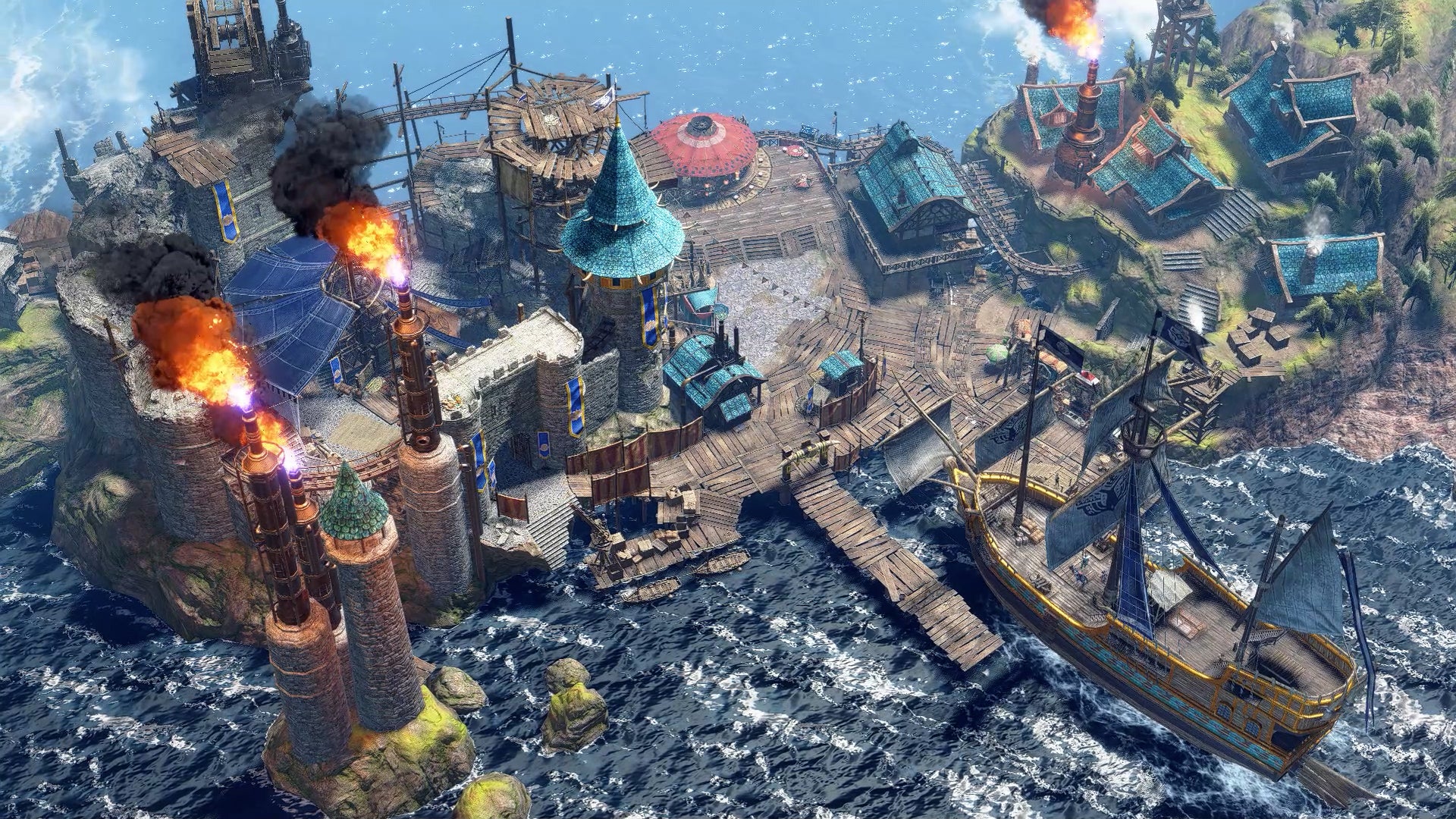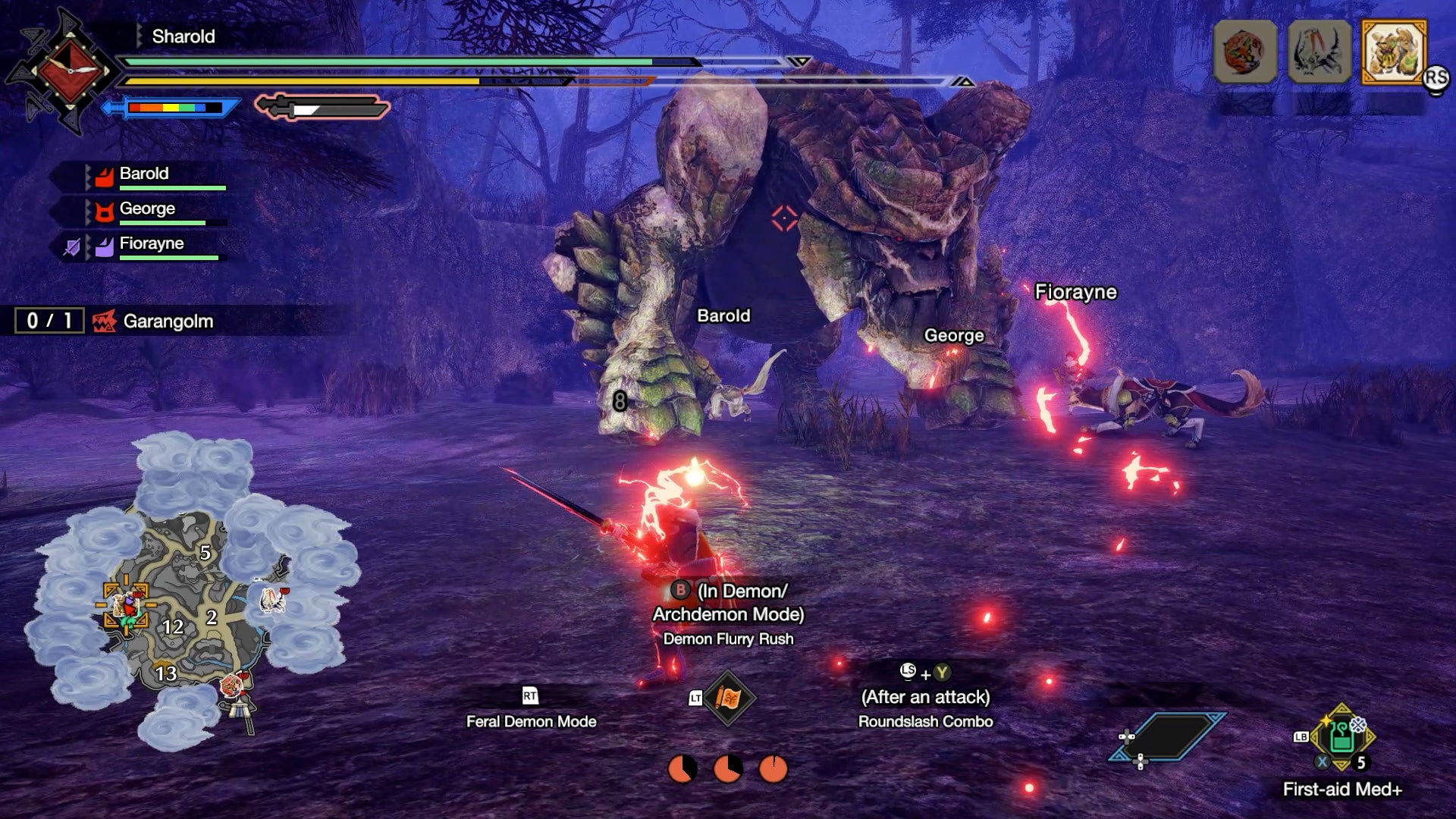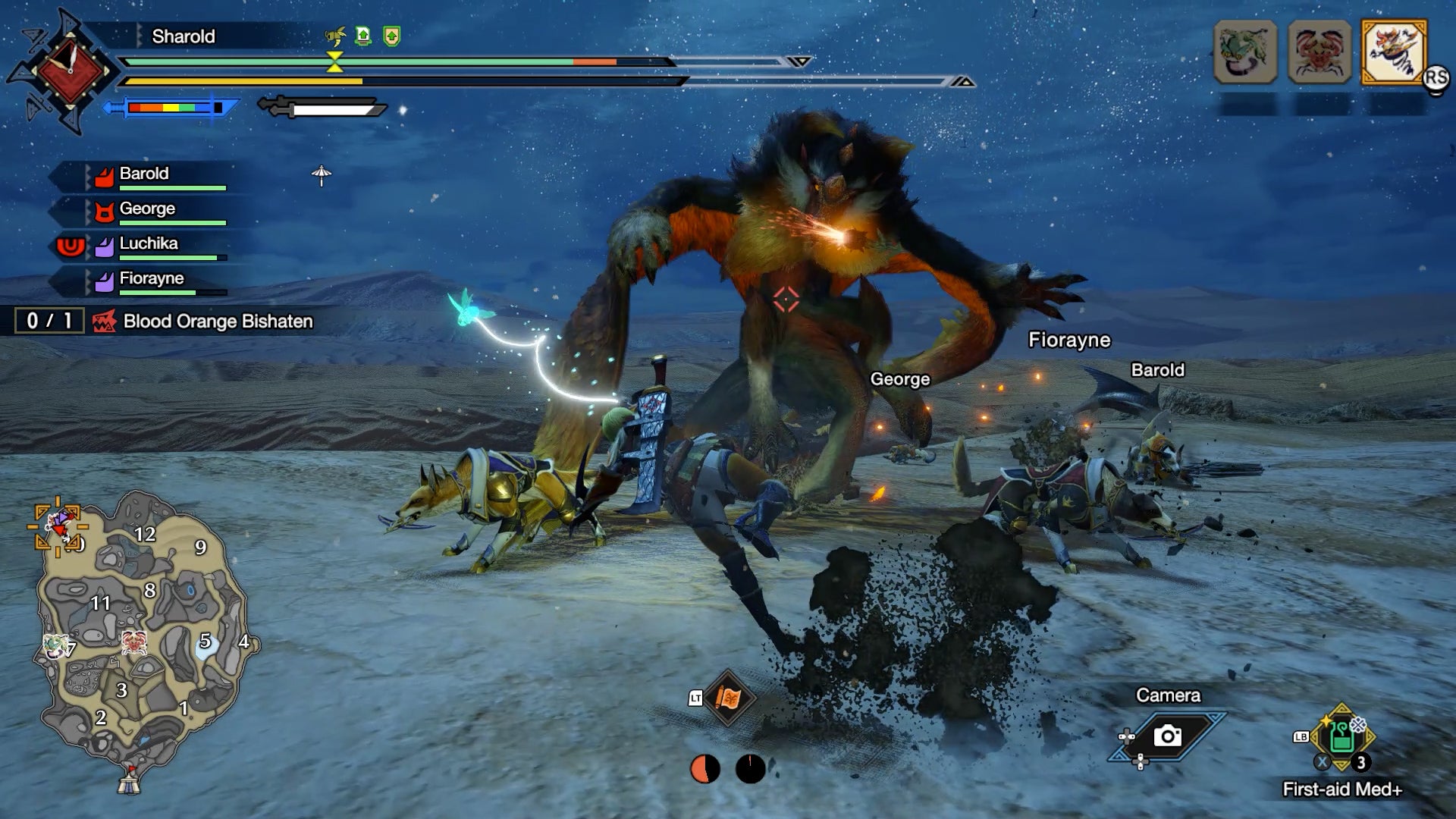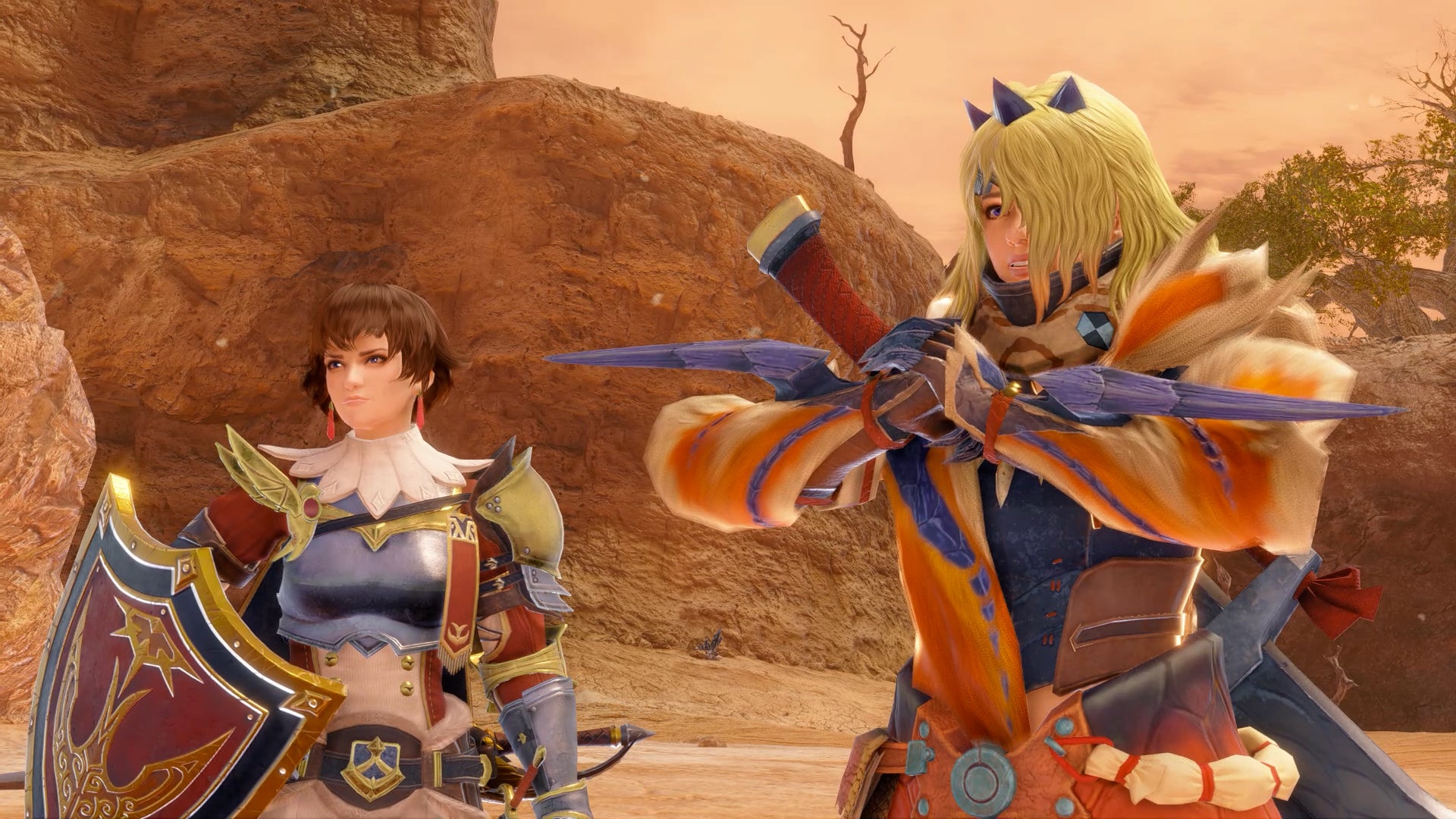More importantly, early-game Monsters felt a little more forgiving. The consequences for biffing a dodge or pulling off a poorly timed combo were minimal, and creatures would perish quickly even when playing solo. Things absolutely got harder towards the end of the game’s hub quests (and the less said about its wretched late-game rampage missions the better) but on the whole, you could see the majority of what Rise had to offer without breaking too much of a sweat. If the goal of Rise was to create a more accessible version of a traditional Monster Hunter title, then I guess the intention behind its Sunbreak expansion is to do the same for the series’ infamous end-game content. Sunbreak is hard, basically. But not too hard. It throws encounters at you that are substantially more difficult than those found in the base game, but like Rise, it provides a number of fresh accessibility and quality of life features to help you cope with its brand new master rank quests. Unlocked after completing the seven-star hub quest Serpent Goddess of Thunder, Sunbreak whisks players away to Elgado, a fortress that lies in between Kamura Village and a land known simply as “The Kingdom”. Monsters from this region have begun to behave erratically, migrating towards Kamura and threatening to destroy its local ecosystem. Faced with yet another imminent threat (12 people live in Kamura, I don’t think this level of danger is worth sticking around for personally) it’s decided that the best course of action is for you to do what you do best: stab a lot of monsters before using their skin to make a cool hat. The story of Sunbreak is… fine? It’s nice to be provided with a hub area based on European architecture, but the expansion’s new characters can be summarised simply as “English” in the broadest and most unimaginative sense of the word. Think of, like, a stereotypical English knight. That’s 90% of Sunbreak’s cast. They’re… yeah. They’re fine. Still, you’re not going to play Sunbreak for the story, are you? You’re here for the monsters, and Sunbreak’s menagerie of new beasties is top-notch. Alongside the three lords Lunagaron, Garangolm and Malzeno there’s a smattering of returning monsters from previous entries as well as brand new variants of existing creatures from the base game. To reveal them all would be a pretty naff spoiler, but rest assured that each new addition is beautifully animated and an absolute blast to fight. The lords, in particular, are a notable highlight. Inspired by European horror fiction, they’re a trio of ghastly monstrosities that feel wholly distinct from Rise’s titans, whose designs cribbed from Japanese folklore instead. Garangolm is a hulking ape adorned in moss-covered stone armour, his right arm infected with veins of pulsating lava. His angular head and mismatched body parts gives him an air of Frankenstein’s monster, albeit one made by a doctor who presumably played a lot of early-2000’s action RPGs on their PSP. Meanwhile, Lunagaron and Malzeno are more easily identifiable as a werewolf and a Dracula respectively. Malzeno in particular is an inventive take on the classic horror trope, an ancient dragon whose plumage and wings resemble the iconic waistcoat and cloak of Whitby’s favourite bloodsucker. They’re brilliant. Combined with new locale “the Citidel” (easily the standout addition in terms of new arenas to explore) the three lords provide a distinct flavour to Sunbreak that will prove a breath of fresh air to Rise veterans. Battling these screeching behemoths while drenched in purple light, the silhouette of a dilapidated castle hanging menacingly in the background, feels a world away from hunting Great Izuchi in the Shrine Ruins. It’s eerily beautiful. Saying that, don’t expect your time with Sunbreak to be all about this new stuff. With the exception of a giant enemy crab that kicks off the story, the first few hours of the game pit you up against master rank versions of existing monsters in familiar locations. Sure, it’s an important measure to ensure players are able to craft the appropriate gear for future hunts, and new armour and weapon sets made from familiar critters definitely keep things interesting. But if you’re already sick to death of hunting Khezu there’s a chance you might find the intro to Sunbreak a little tedious. I’ll admit, if I have to hunt one more Almudron I’m going to become the Joker. Still, the joy here is to be found in that master rank difficulty. Whether you’re fighting Lunagaron or Somnacanth, master rank provides a stack of challenging encounters that test your skills far more than the base game ever did. Even when battling creatures I was overly familiar with at this point, I had my arse kicked more times than I care to admit. With a single swipe from a monster capable of chewing through 75% of my health bar, Sunbreak encouraged me to study an enemy’s moves to avoid failure. Whereas in the base game I would batter monsters with sleepy ease, Sunbreak’s advanced difficulty forced me to form a deeper appreciation for the complexity of monster animation and design. Hunts in Rise have never been more dynamic or exciting as they are here, basically. They are fraught, exhausting excursions, where victory can be snatched away at any moment by the gnashing fangs of a ferocious snake wolf. If you take your eye off the ball even for a second, you’ll pay for your complacency with a one-way trip back to camp. It’s marvellous stuff. I will say, though, that the game is tough but not overly so. Although I fainted once or twice when facing off against something new, I only outright failed a mission once throughout my time with the expansion (the newly added bleed effect is no joke). I do wonder how Monster Hunter veterans will fare in comparison. Thankfully the addition of follower collab quests is sure to keep even the most jaded hunter occupied. These single-player missions allow you to embark on hunts with characters from both the expansion and the base game, such as newcomer Fiorayne, or Minoto and Hinoa the Kamura quest maidens. These missions come in two flavours - support surveys and follower quests. Follower quests see you head off with a specific character, whereas support surveys allow you to pick from a list of NPCs that grows as you progress through the expansion. Follower quests are wonderful, emulating the coordinated chaos of online play surprisingly well. Not only do characters have preferred weapon types, but they also behave differently from one another too. They can heal you, place traps and even wyvern ride, all while barking out little snippets of dialogue. More than anything, it’s just nice to have a little company during solo hunts. A jpg image of a rat eating spaghetti would have been a welcome replacement for the base game’s rampage quests, to be honest, but thankfully follower quests are an exceptional alternative. Sure, the structure of these activities is the same as every other mission in the game, but being able to customise your team of followers gives you far more reasons to replay them than rampage missions ever did. Besides, the best bit of Monster Hunter is, you know, hunting the monsters. I’m glad Capcom leaned into that a little more this time around. Alongside new monsters and locales are a laundry list of features that enhance and tweak pretty much every aspect of the game. New endemic life, new bunny dango, the ability to wall run without initiating a wirebug launch first, etc. Chief among them, though, is the introduction of Switch Skill Swap, a new ability that allows you to switch between two different weapon move loadouts during a fight. Coupled with a stack of new silk bind moves for all 14 weapons as well as the ability to dodge mid-swap, Switch Skill Swap makes combat in Sunbreak even more spirited than it was in the base game. As a dual-blade aficionado, who spends a worrying amount of time next to the monster despite how often they knock me on my butt, the ability to swap between two different silk bind moves proved to be a lifesaver. It’s a brilliant way of giving players a little more mobility and choice when facing off against tougher beasts, and I’d be shocked if it doesn’t become a core part of the series’ formula moving forward. So, I guess Sunbreak is maybe a little less grand than I expected? The new monsters are neat, as are the excellent follower quests, but as a whole Sunbreak feels a whole lot like Rise with a bunch of quality of life features thrown in. The true appeal, really, lies in that advanced difficulty. If you’re desperate for a challenge, to face off against monsters whose ferocity finally matches their stature, to use their bones for fancy new armour sets that celebrate those achievements, then Sunbreak is for you. Still, I liked Sunbreak a hell of a lot. Rise was such a phenomenal foundation to build upon that simply having an excuse to go back to it was good enough for me. With Sunbreak, Rise feels complete. It’s a brilliant expansion that is sure to delight anyone who looks at a photo of a dragon and thinks to themselves “I reckon you could make a wicked pair of trousers out of that”.



